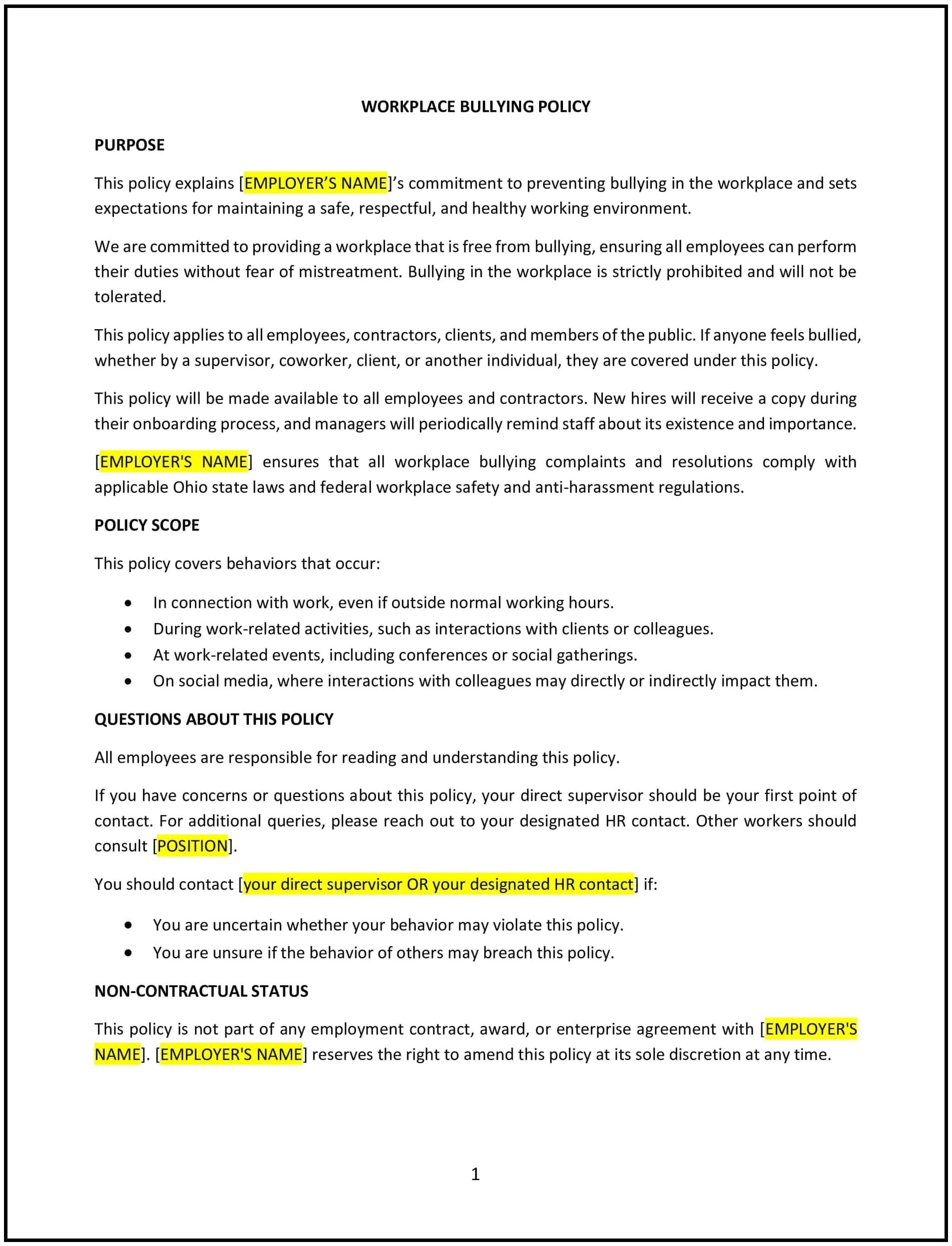Got contracts to review? While you're here for policies, let Cobrief make contract review effortless—start your free review now.

Customize this template for free
Workplace bullying policy (Ohio)
A workplace bullying policy provides Ohio businesses with clear guidelines for preventing and addressing bullying behavior in the workplace. This policy outlines what constitutes bullying, sets expectations for respectful behavior, and defines the procedures for reporting and addressing incidents of bullying. It also details the responsibilities of employees and management in fostering a positive, supportive work environment. The goal is to ensure that all employees are treated with respect, that bullying behavior is promptly addressed, and that a safe, non-hostile work environment is maintained.
By implementing this policy, Ohio businesses can prevent harmful behavior, protect employee well-being, and promote a healthy, collaborative workplace culture.
How to use this workplace bullying policy (Ohio)
- Define bullying behavior: The policy should clearly define what constitutes workplace bullying, including verbal abuse, intimidation, exclusion, spreading malicious rumors, or any other behavior that creates a hostile or unsafe work environment. The policy should be specific about behaviors that are considered unacceptable.
- Set reporting procedures: The policy should specify how employees should report incidents of bullying, including whom to contact (HR, a supervisor, or designated representative), the process for reporting (e.g., written, verbal, or online), and the steps the business will take to investigate and address complaints.
- Establish confidentiality: The policy should ensure confidentiality for those involved in bullying incidents, including the reporter, the accused, and any witnesses. It should clarify how information will be shared and who will be privy to the details of the investigation.
- Address disciplinary actions: The policy should outline the consequences of bullying, which can range from warnings to termination, depending on the severity of the behavior. It should ensure that consequences are applied fairly and consistently across all levels of the organization.
- Encourage early intervention: The policy should emphasize the importance of addressing bullying behavior as early as possible to prevent escalation. Employees should be encouraged to report incidents promptly, and managers should be proactive in identifying and addressing issues before they become larger problems.
- Provide training: The policy should require training for all employees on recognizing bullying behavior, how to report incidents, and how to foster a respectful work environment. Training should be provided regularly and should address both prevention and intervention strategies.
- Outline support for affected employees: The policy should detail the support available for employees who are victims of bullying, such as counseling services, mediation, or changes in work assignments. It should ensure that employees feel safe and supported during and after the investigation.
- Review and update regularly: The policy should be reviewed periodically to ensure it reflects Ohio state laws, federal regulations, and the evolving needs of the business. Adjustments should be made as necessary to keep the policy relevant and effective.
Benefits of using this workplace bullying policy (Ohio)
This policy provides several key benefits for Ohio businesses:
- Promotes a respectful work environment: By defining and addressing workplace bullying, the policy helps create a culture of respect and inclusivity where all employees feel valued and treated fairly.
- Reduces liability: A clear anti-bullying policy helps businesses minimize the risk of legal claims related to harassment or discrimination, as it demonstrates that the business takes workplace bullying seriously and has a plan to address it.
- Increases employee well-being: When bullying is addressed, employees are more likely to feel safe and supported, which improves overall well-being and mental health. This leads to a more productive and engaged workforce.
- Strengthens retention: Employees who work in a bullying-free environment are more likely to stay with the business, reducing turnover and the associated costs of hiring and training new staff.
- Enhances company reputation: A strong commitment to preventing bullying improves the company’s reputation as a responsible and ethical employer, attracting talent and fostering positive relationships with employees.
- Improves productivity: A respectful and safe work environment leads to increased employee morale, higher productivity, and better teamwork, as employees can focus on their tasks without fear of harassment or intimidation.
- Supports legal compliance: The policy helps ensure compliance with Ohio state laws and federal regulations related to workplace harassment and discrimination, reducing the risk of legal challenges.
Tips for using this workplace bullying policy (Ohio)
- Communicate the policy clearly: Ensure that all employees are aware of the workplace bullying policy by including it in the employee handbook, discussing it during onboarding, and providing periodic reminders about the expectations for behavior in the workplace.
- Encourage reporting: Employees should feel comfortable reporting incidents of bullying without fear of retaliation. The policy should clearly outline the steps for reporting, the support available to employees, and how confidentiality will be maintained.
- Ensure prompt intervention: Address bullying incidents as quickly as possible, even if they seem minor, to prevent escalation. Managers should be trained to identify early signs of bullying and intervene proactively.
- Provide ongoing training: Regularly provide training for employees and managers on identifying, preventing, and responding to bullying behavior. The training should include clear examples of what constitutes bullying and how to report it.
- Track and address patterns: If incidents of bullying continue or escalate, the business should track the patterns and take steps to address any systemic issues that may be contributing to the problem.
- Protect employees during investigations: Ensure that the investigation process is fair and respectful of everyone involved, protecting the rights of both the reporter and the accused. The business should take steps to minimize disruptions to the workplace while the issue is being addressed.
- Review the policy periodically: The policy should be reviewed and updated regularly to reflect Ohio state laws, federal regulations, and any changes in the business’s workplace practices or values.